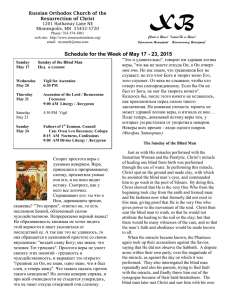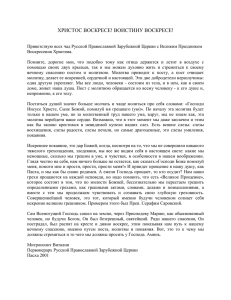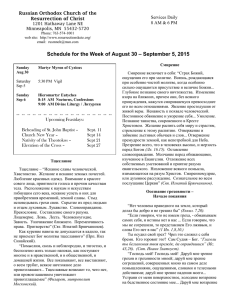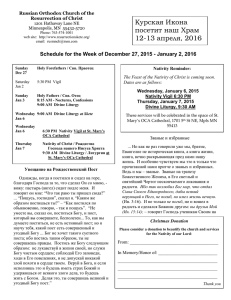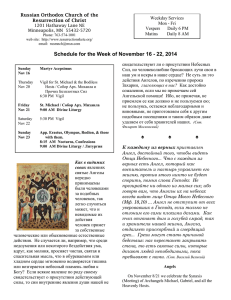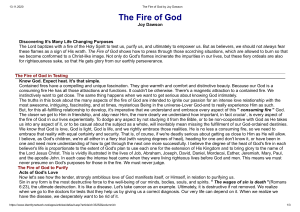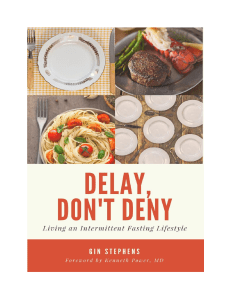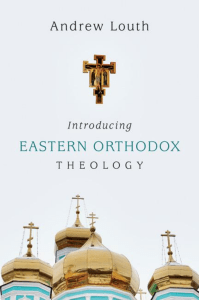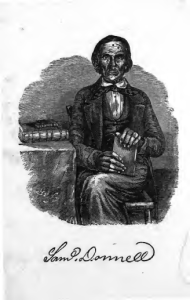Март 2009 - All Saints of Russia Orthodox Church
реклама
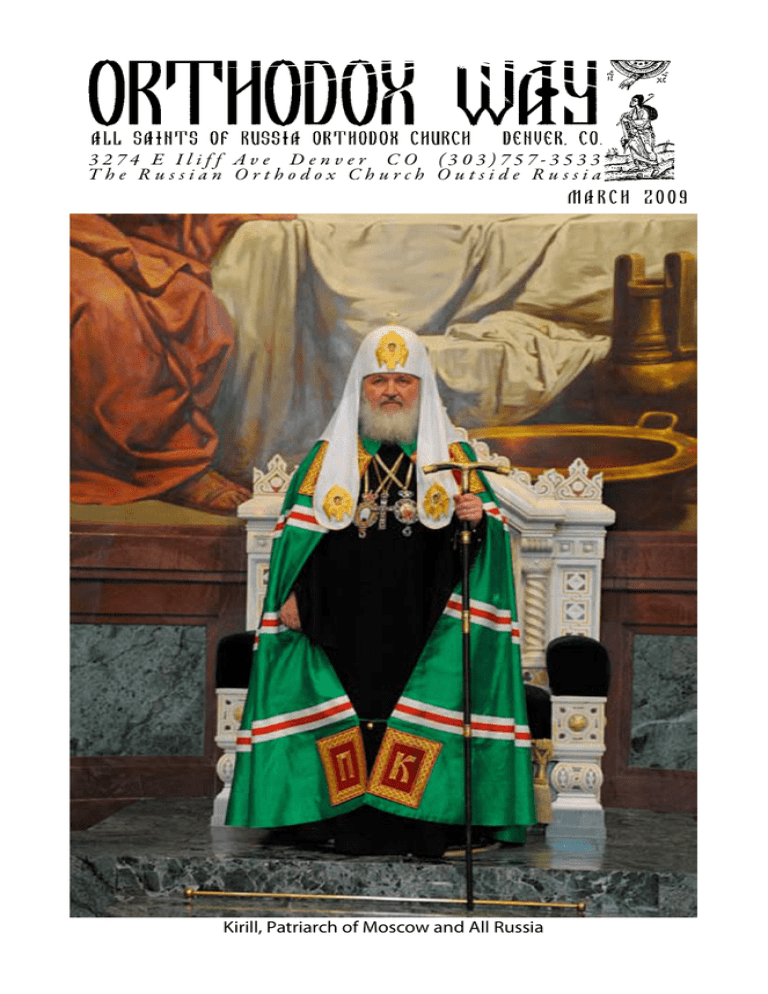
3274 E Il i f f Av e D e n v e r C O (3 0 3)757-3533 The Russian Orthodox Church Outside Russia march 2009 Kirill, Patriarch of Moscow and All Russia All Saints of Russia Orthodox Church Diocese of Western America Russian Orthodox Church Outside Russia 3274 E. Iliff Ave. Denver, Colorado 80210 (303) 757-3533 Parish Clergy: Priest Boris Henderson, Rector Home (303) 753-1401 Cell phone (720) 244-3255 Priest Michael Preobrazhensky Deacon Jan Veselak Reader Timothy Henderson Taper-bearer Vladimir Lander Parish Staff: Warden: Alexander Yaremenko Treasurer: Alexandra Timofeeva Secretary: Petronia Taraschuk Choir Director: Mat. Natalia Sisterhood President: Liliya Trotsenko Times of Divine Services: Saturday 6:00 p.m. All-Night Vigil Sunday 9:40 a.m. Hours Sunday 10:00 a.m. Divine Liturgy For services on the Great Feasts, Saints’ Days, and the days of Great Lent, check the monthly calendar. 2 Parish Directory D ear parishioners, the editorial committee of our parish directory publication is finishing the data preparation phase of the project. We ask those of you who had not done so yet to contact warden to verify your contact information. If you do not wish your information published, please communicate this to the warden. According to the policy approved by parish council, this publication will be strictly for internal use. Only valid parish members, who indicated their interest and agreed to publish their contact information, will receive copies of the directory. Приходской Справочник Д орогие прихожане, редакционная комиссия приходского справочника находится на завершающей стадии сбора данных. Мы просим тех из вас, кто еще не сделал этого, обратиться к старосте с тем, чтобы сверить ваш телефон, адрес и правильное написание вашего имени. Если по каким-то причинам вы не хотите публиковать вашу контактную информацию в справочнике, просим уведомить старосту заблаговременно. В соответсвии с решением приходского совета справочник предназначается исключительно для облегчения сообщений между членами прихода. Таким образом только настоящие члены прихода, выразившие желание учавствовать в этой программе, получат копии справочника. Date Baptismal name Mar15 Sabbatius Mar17 Vyacheslav Mar20 Eugene Mar22 Eli Mar29 Patricia Mar30 Alexey Namesdays Last name First name Vaschenko Savvaty Zhurin Vyacheslav Katsnelson Yevgeny Kosanovich Eli Bresette Patricia Bakounina-Evernden Alexey May God grant them many years!. Prayers for the sick youth Anna Preobrazhensky youth John Carey John Dunn Yuri Prizemin Vladimir Shlomov May God heal them of their ailments and give them strength during the time of illness. 3 MOSCOW: January 28, 2009 Epistle of the Local Council of the Russian Orthodox Church Dear in the Lord Pastors, Divinely-Wise Monks and Nuns, Beloved Brothers and Sisters, faithful children of our Holy Church! he Local Council [Pomestny Sobor], held on January 27-28, 2009, at the Cathedral of Christ the Savior, addresses you with the words of the Apostle: “The grace of the Lord Jesus Christ, and the love of God, and the communion of the Holy Ghost, be with you all” (2 Corinthians 13:14). The Council has deemed worthy the fruits which, by the mercy of God, our Church has brought to the Lord over these last eighteen years since the last Local Council. At that Council, by the will of the Holy Spirit, the Hierarchy and the people of God chose His Holiness Patriarch Alexy II of Moscow and All Russia of blessed memory. This Council approved the works of the Councils of Bishops from 1990-2009, and the ecclesiastical efforts in various areas made during the Patriarchal service of His Holiness the late Patriarch. Expressing due gratitude to him for all his labors and cares, we appeal to our pastors and children of our Church to prayerfully remember our late Patriarch. His Holiness strove tirelessly to preserve the unity of the Church, protecting her from schisms and divisions, uniting people of various nationalities, generations and social strata. The main deed achieved by His Holiness the Patriarch, together with the late Metropolitan Laurus of blessed memory, was the reestablishment of the unity of the Russian Church Abroad and the Church in the Fatherland. And today, remembering the legacy of our late Patriarch, we must preserve and strengthen church unity, not allowing anyone to sow the seeds of discord among us. Keeping “the unity of the Spirit in the bond of peace” (Ephesians 4:3) is a sign of the presence of Christ Himself in the community of His followers. Even as we preserve unity in the main thing—the Holy Orthodox Faith—we can have differences in individual questions relating to the life of the Church or society. But these differences must not lay the foundation for enmity, division and unfair accusations. The Local Council supports the document of the Holy Council of Bishops of 2008 “On the Unity of the Church” and calls upon the Fullness of the Church to follow it. On January 27 of this year, by the will of the Holy Spirit, the Council elected His Eminence Metropolitan Kirill of Smolensk and Kaliningrad as the Patriarch of Moscow and All Russia. T 4 We ask the entire Church flock to fervently pray that our Chief Pastor, the Lord Jesus Christ, bountifully pours forth His mercies on the service of the new, sixteenth Patriach of Moscow and All Russia, that He grant him undiminished help in all his efforts, strengthen his spiritual and physical powers towards service to the Holy Church, that the Patriarchal labors of His Holiness Vladyka, our Father, the newly-elected Patriarch Kirill, bring fruits blessed by God. During the last century, our Church passed through the furnace of tribulations, preserving faith and devotion to Christ. Today, new possibilities arise before her: missionary work, which we must actively pursue, for the Christian mission is the direct legacy of the Savior. The Resurrected Christ calls upon His disciples to follow Him and preach Divine Truth. The Lord came to save, but, in the words of the Apostle, “How then shall they call on him in whom they have not believed? and how shall they believe in him of whom they have not heard? and how shall they hear without a preacher?” (Romans 10:14). May we all be servants and preachers of Christ the Savior, “by whom we have received grace and apostleship” (Romans 1:5). The pastoral word and the example of Christian good works must reach the hearts of those who call themselves Orthodox Christians, but do not live a churchly life. For they are also a part of our Church, called by the Lord towards salvation. Rejoicing at the growing number of churches and priests, we must remember that it is the condition of the souls of men, their participation in the Mysteries and divine services, their moral and spiritual image that are the essential criteria of the efforts of the Church. We are called upon to bear witness to the truth of the Gospel of Christ, “that they might have life, and that they might have it more abundantly” ( John 10:10). We must declare that only by following the eternal and unchanging moral values granted by Divine Revelation will we be able to overcome internal individual crises, the disintegration of the family and social problems. The Church carries this testimony to the entire world, to all people, especially children and youth. This is precisely why we must take the opportunity today to boldly turn to the young generation through preaching, through school, through the mass media. Service to the church has always been yoked to care for people, those who need help and sympathy. Our duty is to feed the hungry, give shelter to the homeless, defend the unfairly injured, help the elderly, support the lonely, lighten the burden of the ailing, console those in despair. The Local Council calls upon all the devoted flock of our Church to strengthen their unity in the name of Christ under the omophorion of our new Primate, His Holiness Patriarch Kirill of Moscow and All Russia. 5 Through unified effort we must “work out [our] own salvation with fear and trembling” (Philippians 2:12) and participate in the spiritual education of those near and far. “Pray,” said the Apostle, “that the word of the Lord may have free course, and be glorified” (2 Thessalonians 3:1). The most important thing is that we abide in the love of Christ, which supersedes state borders, national or other divisions, that we may fulfill the testament of the Savior, Who prayed his Heavenly Father for those who believe in Him: “that they all may be one; as thou, Father, art in me, and I in thee, that they also may be one in us” ( John 17:21). May the Lord God, glorified in the Holy Trinity, through the intercession of the Most-Pure Mother of God, by the prayers of the New Martyrs and Confessors and all the saints of our land, have mercy upon us and save us, through His grace and love for mankind. Amen. Press Service of the Local Council МОСКВА: 28 января 2009 г. Послание Поместного Собора Русской Православной Церкви Возлюбленные о Господе пастыри, богомудрые иноки и инокини, дорогие братья и сестры—верные чада нашей Святой Церкви! остоявшийся 27–28 января 2009 года в Храме Христа Спасителя Поместный Собор Русской Православной Церкви обращается к вам апостольскими словами: Благодать Господа нашего Иисуса Христа, и любовь Бога Отца, и общение Святаго Духа со всеми вами (2 Кор. 13, 13). Собор оценил плоды, которые, по милости Божией, принесла Господу наша Церковь за восемнадцать лет, прошедшие со времени предыдущего Поместного Собора. На том Соборе, изволением Святого Духа, Священноначалием и народом Божиим был избран приснопамятный Святейший Патриарх Московский и всея Руси Алексий II. Настоящий Собор одобрил деяния Архиерейских Соборов 1990-2009 годов и церковные труды в различных областях, совершенные за годы Первосвятительского служения почившего Святейшего Патриарха. Воздавая ему должное за все труды и заботы, мы обращаемся к пастырям и чадам нашей Церкви, призывая их к молитвенной памяти о почившем Первосвятителе. Святейший Патриарх Алексий неустанно стремился сохранять единство Церкви, оберегая ее от расколов и разделений, объединяя людей разных национальностей, поколений, социальных слоев. Важнейшим деянием, совершенным Святейшим Патриархом С 6 совместно с блаженнопочившим митрополитом Лавром, стало восстановление единства Русской Зарубежной Церкви с Церковью в Отечестве. И сегодня, памятуя заветы почившего Первосвятителя, нам нужно хранить и укреплять церковное единство, не допуская, чтобы кто-либо посеял между нами даже тень разделения. Единство духа в союзе мира (Еф. 4, 3) есть знак присутствия Самого Христа в общине Его последователей. Храня единство в главном—в святой вере православной, мы можем иметь расхождения в частных вопросах, относящихся к жизни Церкви или общества. Но эти разномыслия не должны быть поводом к вражде, разделениям, неправедным обвинениям. Поместный Собор поддерживает определение Освященного Архиерейского Собора 2008 года «О единстве Церкви» и призывает всю Полноту церковную следовать ему. 27 января сего года, изволением Святого Духа, Собор избрал Патриархом Московским и всея Руси Высокопреосвященнейшего Кирилла, митрополита Смоленского и Калининградского. Мы просим всех чад церковных усердно молиться о том, чтобы Пастыреначальник Господь Иисус Христос обильно излил милость Свою на служение нового, шестнадцатого Патриарха Московского и всея Руси, подал ему неоскудеваемую помощь во всех его делах, укреплял его духовные и телесные силы для служения Святой Церкви, чтобы Первосвятительские труды Святейшего Владыки и Отца нашего избранного Патриарха Кирилла принесли благословенный Богом плод. В минувшем столетии наша Церковь прошла через горнило испытаний, сохранив веру и верность Христу. Ныне перед ней открываются новые возможности миссионерского служения, которые необходимо активно использовать, ибо христианская миссия—это прямой завет Спасителя. Воскресший Христос призывает Своих учеников последовать Ему и проповедовать Божественную Истину. Господь пришел спасти, но, по слову апостола, как призывать Того, в Кого не уверовали? как веровать в Того, о Ком не слыхали? как слышать без проповедующего? (Рим. 10, 14). Будем же все служителями и проповедниками Христа Спасителя, через Которого мы получили благодать и апостольство (Рим. 1, 5). Пастырское слово и пример христианского доброделания должны достичь сердец тех людей, которые именуют себя православными, но не живут церковной жизнью. Ведь и они—часть нашей Церкви, призванная Господом ко спасению. Радуясь возросшему числу храмов и священников, мы должны помнить, что именно состояние душ людей, их участие в Таинствах и богослужении, их нравственный и 7 духовный облик суть критерии успеха усилий Церкви. Мы призваны свидетельствовать о правде Евангелия Христова, о том, что во Христе—жизнь, и жизнь с избытком (см. Ин. 10, 10). Мы должны говорить о том, что только следование вечным и неизменным нравственным ценностям, данным в Божественном откровении, позволит преодолеть внутренний кризис личности, разлад в семье и нестроения в обществе. Церковь несет это свидетельство всему миру, всем людям, особенно детям и молодежи. Именно поэтому мы должны сегодня иметь возможность нестесненно обращаться к юному поколению—через проповедь, школу, средства массовой информации. Служение Церкви всегда сопряжено с заботой о людях, нуждающихся в помощи и участии. Наш долг—накормить голодного, дать кров бездомному, защитить несправедливо обижаемого, помочь престарелому, поддержать одинокого, облегчить страдания болящего, утешить отчаявшегося. Поместный Собор призывает всех верных чад нашей Церкви укреплять единство во имя Христово под омофором нового Предстоятеля—Святейшего Патриарха Московского и всея Руси Кирилла. Общими трудами нам надлежит совершать наше спасение (Флп. 2, 12) и содействовать духовному просвещению ближних и дальних. Молитесь,—сказал апостол,—чтобы слово Господне распространялось и прославлялось (2 Фес. 3, 1). Главное же— пребудем в любви Христовой, которая превыше государственных границ, национальных и иных различий, дабы исполнить заповедь Спасителя, Который молил Отца Небесного о верующих в Него: да будут все едино, как Ты, Отче, во Мне, и Я в Тебе, так и они да будут в Нас едино (Ин. 17, 20–21). Во Святей Троице славимый Господь Бог, предстательством Пречистой Богородицы, молитвами новомучеников, исповедников и всех святых, в земле нашей просиявших, помилует и спасет нас, яко благ и человеколюбец. Аминь. Пресс-служба Поместного Собора 8 Великий Пост—Весна для души †Епископ Александр (Милеант). “Се—время благоприятное, се —день спасения.” есной пробуждается и оживает природа. В это же время духовно обновляются христиане, серьезно относящиеся к спасению своей души. В этом им содействует Великий пост. Постами называются дни, предназначенные для того, чтобы верующие особо позаботились о спасении души. Существует несколько периодов в году, именуемых постами. Важнейшим из них является так называемый “Великий” пост, приуроченный к предпасхальному времени. Этот пост начинается с понедельника после Прощеного воскресения, за сорок дней (шесть недель) до Вербного воскресения и переходит в Страстную неделю. Кончается Великий пост в день Светлого Христова Воскресения. Великий пост именуется также св. Четыредесятницей. В Необходимость воздержания Пост в собственном своем значении означает воздержание в пище, питие и удовольствиях. Иногда воздержание выражается в совершенном неядении (в продолжение одного или нескольких дней), чаще же всего в неядении мясной и молочной, так называемой, скоромной пищи. С этой точки зрения, на языке медицины пост может быть назван периодом диеты. Необходимость воздержания в пище, в обуздании чрева вытекает из самого устройства человека, имеющего, кроме тела, бессмертную душу. Из-за греховной испорченности человеческой природы 9 нарушена гармония между человеческим телом и душой, в результате чего греховные желания тела большей частью берут верх, а иногда и совсем подавляют в человеке все добрые порывы его души. Человек превращается в раба своих страстей и, таким образом, становится хуже животного. Обуздать насилие своей физической природы, дать раскрыться и окрепнуть возвышенным стремлениям души возможно только с помощью поста. Вот почему Церковь придает посту такое большое значение и утверждает, что Без поста невозможна христианская жизнь. Важно обратить внимание на тот факт, что воздержание или своего рода пост был заповедан нашим прародителям Адаму и Еве, когда они еще находились в раю и были безгрешными (Бытие 2:17—запрещение вкушать плоды дерева “познания добра и зла”). Тем более пост стал необходимостью после их грехопадения, и поэтому на протяжении всей священной истории мы видим, как праведные люди строго постились в разные периоды своей жизни. Приведем несколько примеров. Великий пророк Моисей, законодатель Ветхого завета, постился в течение сорока дней перед получением от Бога десяти заповедей на Синайской горе (Исх. 34:28). Часто постился праведный царь Давид, о чем мы можем заключить из его боговдохновенных псалмов. Постился великий пророк Илия (3 Цар. 19), взятый живым на небо. Постился пророк Даниил перед тем, как получил откровение от Бога о судьбах своего народа (Дан. 10 гл.). Пророк и креститель Господень Иоанн был великим постником, научившим поститься и своих учеников. Пророчица Анна, не отходя от храма, служила Богу постом и молитвой день и ночь, и за это удостоилась благодати Божией и откровения о рождении Спасителя (Лк. 2:37). Постился даже безгрешный Богочеловек, Господь наш Иисус Христос в течение сорока дней, чтобы приготовить Себя к делу спасения мира. Постились и Его ученики, святые апостолы, о чем можно заключить из их посланий (Деяния 13:3; 1 Кор. 7:5 и 9:27; 2 Кор. 6:5 и 11:27). Посвящать известные дни года посту стало всеобщей практикой в ранней христианской церкви апостольских времен. О необходимости поста мы находим указания в книгах Нового завета. На упрек фарисеев в том, что ученики Христовы не постятся, Господь ответил, что для них время поста еще не настало, пока с ними пребывает Жених (Христос), но когда отнимется от них Жених (тоесть умрет Христос), тогда будут поститься (Лк. 5:33-35). Поэтому с апостольских времен вошло в обычай поститься по средам, когда Иуда предал Христа, и по пятницам, когда Господь Иисус Христос 10 был распят и умер на кресте. По этой же причине Великий пост приурочен Церковью к дням, предваряющим Страстную неделю. На вопрос учеников, почему они не могли изгнать беса, Господь ответил, что “этот род (бесовский) изгоняется только молитвой и постом” (Мт. 17:21). Действительно, бесы большей частью действуют через нашу плотскую природу, возбуждют в ней беспорядочные страсти, чем толкают нас на всевозможные грехи и, таким образом, берут контроль над нашей волей. Чтобы освободиться от их влияния, необходимо воздержанием ослаблять плоть и укреплять дух. Конечно, надо поститься ради исправления себя, а не ради людской похвалы, как Господь объяснил в Своей Нагорной проповеди, сказав: “Явись постящимся не перед людьми, но перед Отцом твоим, Который втайне, и Отец твой, видящий тайное, воздаст тебе явно” (Мт. 6:18). Преемники апостолов, св. отцы и учители церковные, внушали христианам поститься в Великий пост. “Четыредесятницей не пренебрегайте,”—пишет св. Игнатий Богоносец к христианам в Филиппах,—“она составляет подражание жительству Христа.” Блаженный Иероним от лица всех христиан своего времени говорил: “Мы постимся Четыредесятницу по преданию апостольскому.” “Чем более дней поста, тем лучше лечение; чем продолжительнее поприще воздержания, тем обильнее приобретение спасения,” учит блаженный Августин. Святые отцы, объясняя важность воздержания в пище, настаивали и на том, что надо одновременно воздерживаться от пороков, ибо в нравственном исправлении человека состоит главная цель поста. “Пользу поста,—учит св. Василий Великий,—не ограничивай одним воздержанием в еде, потому что истинный пост есть устранение от злых дел. Разрешай всяк союз неправды. Прости ближнему оскорбление, прости ему долги. Ты не ешь мяса, но обижаешь брата… Будем поститься постом угодным Богу. Истинный пост есть удаление зла, воздержание языка, подавление в себе гнева, отлучение похотей, злословия, лжи и клятвопреступления. Воздержание от сего есть истинный пост.” Как через невоздержание наших прародителей мы пали и лишились райского блаженства, так через добровольно принимаемый на себя подвиг поста, мы можем возвратить себе потерянное райское блаженство. 11 Lent—A spiritual spring for the soul +Bishop Alexander (Mileant) “This is a favorable time, this is the day of salvation.” ature revives with the arrival of spring, and during this same season Christians who are serious about salvation are spiritualy renewed through prayer and fasting. Fasts are special days of the year that are set aside by the Church to motivate believers to concentrate on the salvation of their souls. The most important of the fasts is Lent, which is prior to the Easter. It begins on the Monday following the Sunday of Forgiveness and lasts for forty days (six weeks) until Palm Sunday, continues into Passion Week, and ends on Easter — the feast of the Resurrection of Jesus Christ. This period is also known as the Forty-day Fast. N On the necessity of abstinence Fasting, by definition, means abstaining from food, drink, and pleasures. Sometimes abstinence is manifested by not eating anything at all (for one or several days). Most frequently, however, it is accomplished by giving up meat and dairy products and switching to vegetarian foods. In medical terms fasting is similar to dieting. It is a diet with an important spiritual goal. The necessity of abstinence of food arises from the human constitution itself, possessing not only a body but an immortal soul. Because of the sinfulness of our nature, the harmony between our body and soul has 12 been disturbed. As a result, the desires of the flesh often predominate and sometimes completely stifle all the soul’s endeavors for righteousness. A person becomes a pitiable slave to his passions and at times worse than an animal. It is possible to restrain one’s physical desires and to allow the soul’s noble aspirations to bloom and strengthen with the help of prayer and fasting. It should be noted that the commandment of abstinence was given to our forefathers Adam and Eve when they were still in paradise and, hence, were sinless. We refer here to the commandment forbidding them to eat the fruits from the tree of the knowledge of good and evil (Genesis 2:17). Fasting became especially necessary after their fall, and we see in the Bible that righteous people throughout the Old and New Testaments fasted during certain periods of their lives. A few examples follow. The great prophet Moses, the law-giver of the Old Testament, had been fasting for 40 days before he received the Ten Commandments from God on Mt. Sinai (Exodus 34:38). The righteous king David fasted frequently as we can conclude from his God-inspired psalms. The great prophet Elijah, (1 Kings ch.19) who was taken up to heaven alive, also used to fast. The prophet Daniel had fasted before he received the revelation from God about the destiny of his people (Acts 10). The prophet John the Baptist fasted to a great extent and also taught his disciples to do so. The prophetess Anna, living at the temple for about fifty years, served God by fasting and praying throughout the day and night. For that she became worthy of God’s grace and received His revelation about the birth of Jesus Christ (Luke 2:37). Even the sinless God-and-man our Lord Jesus Christ fasted for 40 days to prepare for His mission of the salvation of the world. Following His example, the Apostles and the early Christians used to fast also, as can be found in the epistles of Saint Paul (Acts 13:3; 1 Cor. 7:5 and 9:27; 2 Cor. 6:5 and 11:27). From early Church history we learn that the dedication of particular days of the year to fasting became a widespread practice among Christians in the first few centuries. That is why in our time also the Church gives such great importance to Lent and states that without prayer and fasting spiritual growth is impossible. The books of the New Testament teach about the benefits of fasting. In answer to the Pharisees’ reproach that Christ’s disciples did not fast, the Lord answered that the time to fast had not yet arrived because the Bridegroom (Christ) was with them. But when the Bridegroom will be taken away (that is, when Christ dies), then they will fast (Luke 5:3335). Therefore, since apostolic times it has become customary to fast on Wednesdays, when Judas betrayed Christ, and on Fridays, when Jesus 13 Christ was crucified on the cross. For the same reason the Church timed Lent to the days preceding the Passion Week. To the disciples’ question as to why they could not drive out a demon, the Lord answered: “This kind does not go out except by prayer and fasting” (Matthew 17:21). In fact, demons for the most part work through our carnal nature, arousing in it improper passions, thus pushing us towards all kinds of sins, and in this way controlling our will. To free ourselves of their influence, it is necessary to weaken the body and strengthen the soul through abstinence and prayer. Of course, one has to fast for the sake of improving oneself and not to be praised by people, as the Lord explained in his Sermon on the Mount. He said: “So that you do not appear to men to be fasting, but to your Father who is in the secret place; and your Father who sees in secret will reward you openly” (Matthew 6:18). The heirs of the Apostles, the Holy Fathers and teachers of the Church, impressed on Christians the importance of fasting during Lent. “Do not scorn the Forty day Fast,” writes Saint Ignatius of Antioch to the Philippians. “It is the imitation of the life of Christ.” The Blessed Jerome in the name of all Christians of his time said, “We fast during Lent according to the tradition of the Apostles.” “The longer the abstinence, the easier the acquirement of salvation,” teaches Blessed Augustine. The Holy Fathers, explaining the importance of abstaining from food, insisted that one should abstain simultaneously from vices because the moral improvement of a Christian is the main goal of fasting. “The benefit of fasting,” teaches Saint Basil the Great, “is not limited by the abstinence of food alone, because true fasting is the eradication of evil deeds. Everyone should become liberated from lies. Forgive your neighbor when he insults you; forgive him his debts. You don’t eat meat, but hurt your brother … We will fast in a way that is pleasing to God. A true fast is the elimination of evil, restraint of what one says, suppression of anger, the alienation of lust, malignant gossip, lies, and perjury. Abstinence from all these is true fasting.” In summary, just as we fell into sin and lost heavenly bliss because of the lack of restraint of our forefathers, so through voluntary fasting we can restore in ourselves the grace of God. 14 В храме Христа Спасителя, где ожидают оглашения итогов голосования по кандидатам в патриархи, мироточит икона Москва. 27 января. ИНТЕРФАКС кона Божией Матери “Умягчение злых сердец” (Семистрельная) замироточила в храме Христа Спасителя, где во вторник состоялись выборы нового патриарха Московского и всея Руси. Как сообщает телеканал “Вести” со ссылкой на многочисленные свидетельства верующих, икона мироточит, “и очень сильно”. Святой образ, который считается чудотворным, мироточил и раньше. Икона, согласно древней церковной традиции, была специально принесена на нынешний Поместный Собор, более 700 участников которого сегодня проголосовали по кандидатурам на Московский патриарший престол. В Церкви существует древняя традиция приносить особо чтимые иконы и другие святыни на Соборы. И Icon starts streaming myrrh at Cathedral of Christ the Savior Moscow, January 27, Interfax he Softener of Evil Hearts Mother of God Icon at the Cathedral of Christ the Savior in Moscow has started streaming myrrh. Vesti television channel reported citing evidence of numerous churchgoers that the icon was “streaming myrrh very intensively.” In line with a long-standing church tradition, the icon has been specially brought to the Church Council meeting currently being held in Moscow, at which over 700 of its participants earlier cast their ballots to elect a new Patriarch of Moscow and All Russia. T 15 ALL SAINTS OF RUSSIA c/o AMVROSY PATTON 512 CLARK ST GOLDEN CO 80403 FIRST CLASS MAIL 16
